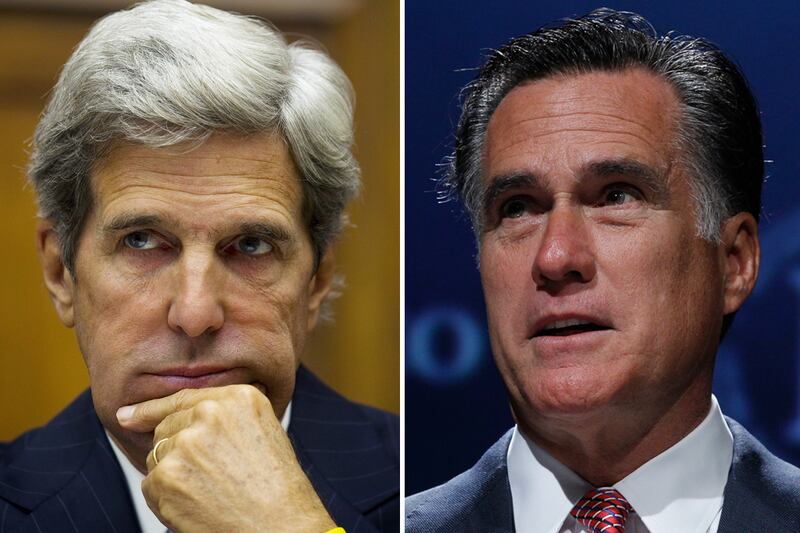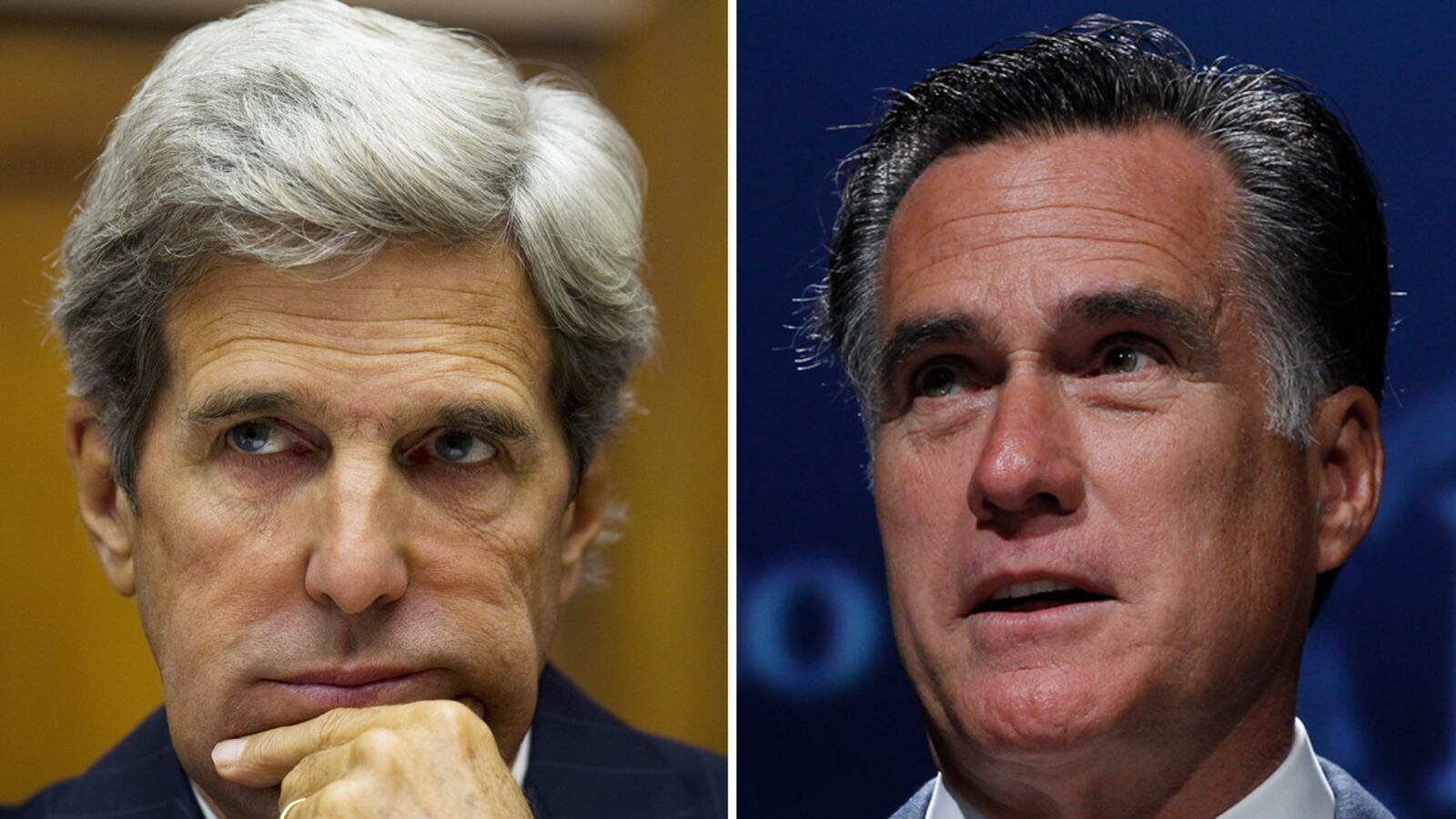With their relentless, shrill attacks on Mitt Romney’s character and business background, Democrats mean to Swift-Boat the GOP standard-bearer in a determined attempt to make him the next John Kerry. According to this strategy, by November the GOP contender will look so thoroughly discredited that the electorate will look past all shortcomings and disappointments associated with the incumbent, just as they did with George W. Bush in 2004. But the dramatic difference in the nation’s financial circumstances from eight years ago and a crucial missing ingredient in the anti-Romney assault make it far more difficult for Obama operatives to shift attention from the state of the economy.

This doesn’t stop gleeful Democrats from pointing to Governor Romney’s undeniable resemblance to the last major-party nominee from Massachusetts, the hapless and arrogant Sen. John Kerry. Aside from common Bay State backgrounds, Kerry and Romney both share long jaws, healthy heads of perfectly coiffed hair, bulging bank accounts, costly vacation homes, an unavoidably aristocratic aura, reputations as flip-floppers, and easily mocked robotic delivery in their public presentations. Those who emphasize the Romney-Kerry connection suggest that these off-putting personality traits make both men juicy targets for negative ads that undermine the very core of their candidacies. In Romney’s case, he’s built much of his campaign on his expertise as a business leader and job creator. In Kerry’s run for the White House, he relied to an even more embarrassing extent on his personal history as a decorated Vietnam War hero.In 2004 GOP allies succeeded in tarnishing Kerry's reputation by raising serious questions about the battlefield citations that earned him his medals. In 2012 Democrats mean to change perceptions of what even Bill Clinton calls Romney’s “sterling career” in business by sliming his leadership at Bain Capital and branding him the nation’s “outsourcer in chief.”
Unfortunately for its plans, the Obama campaign lacks several important advantages that the Bushies enjoyed in 2004. When Swift Boat Veterans for Truth kicked off their campaign against Kerry in August, they had signed up 250 sailors who had served on Swift Boats in Vietnam, including 16 officers who had worked alongside Kerry in Coastal Division 11. Steve Gardner served on Kerry’s own boat crew and talked with me on my radio show several times, sounding both passionate and credible. He offered vivid, firsthand recollections in asserting that the future senator got special treatment due to political connections and never deserved the decorations he received. The Democrats later produced other eyewitnesses and former comrades in arms who emphatically contradicted the testimony of the Swift Boat Veterans for Truth. At the height of the campaign, both sides relied on reminiscences from honorable individuals with strong feelings, both positive and negative, about their interactions with the presidential candidate.
Many commentators also forget that the most devastating anti-Kerry ad from the Swift Boaters involved unforgettable footage featuring an authoritative source that Democrats couldn’t possibly counter: John Kerry himself. The grainy black-and-white film showed the junior officer, shortly after his return from Vietnam, testifying in April 1971 before the Senate Foreign Relations Committee he would later chair himself and accusing U.S. forces of perpetrating “war crimes” as a matter of course during their service in Southeast Asia. Lieutenant Kerry insisted that these atrocities were not “isolated incidents but crimes committed on a day-to-day basis with the full awareness of officers at all levels of command.” He claimed that his fellow members of the military “raped, cut off ears, cut off heads, taped wires from portable telephones to human genitals and turned up the power,” and “razed villages in a fashion reminiscent of Genghis Khan.”
These comments, far more than the back-and-forth over specific battlefield incidents, dented the war-hero image the Kerry team had emphasized throughout the campaign, conveying a whiff of disloyalty that damaged him badly with fellow veterans and many other Americans. The candidate could hardly deny that he had accused the U.S. military of systematic war crimes while the battle still raged in Vietnam: in fact, those very accusations first turned John Kerry into a high-profile public figure and provided the basis for his original bids for public office.
In order to destroy Romney the way the Swift Boat attacks helped to discredit Kerry, Democratic operatives would need to locate some similarly devastating videotape, perhaps of the future candidate delivering a Gordon Gekko–style rant asserting that “greed is good” or chuckling with some of his plutocratic pals over sending American jobs to India. Of course, it’s safe to assume that no such footage exists, or else it would have surfaced long ago in one of Romney’s previous hotly contested campaigns.
It’s also reasonable to expect that his former colleagues at Bain will continue to speak glowingly of his work in the company—work that helped to make them all rich—and continue to back up his accounts on when he ceased his day-to-day involvement in its operations. If some disgruntled former employee wanted to volunteer for a Swift Boat–style commercial, speaking on camera in ominous tones about Mitt’s true rapacious personality, he would have come forward long ago. Romney’s candidacy in 2012 represents the fourth ferociously fought, intensely publicized race of his career, including a prior presidential run in 2008, his gubernatorial race in 2002, and his campaign against Ted Kennedy for the U.S. Senate in 1994. Kerry, by contrast, had cruised to easy victory in all his statewide races in Massachusetts; in 2002 the Republicans hadn’t even bothered to field a candidate against him. The Swift Boat Veterans for Truth caught him by surprise precisely because he’d never before been attacked for his military record. In Romney’s case, his work in equity capital generated controversy in each of his prior campaigns but never seemed to cause him significant damage.
Meanwhile, the economic context of this current contest leaves the Democrats with less chance of success than the Republicans achieved in ’04 when it comes to shifting the debate from the record of the incumbent to the foibles of the challenger.
As the Obama team launches its vitriolic attacks on Romney’s record as a businessman, Republican operatives regularly respond by dismissing these assaults as desperate efforts to turn attention from the president’s record of economic mismanagement. In 2004 Kerry’s defenders couldn’t make that claim, because the economy looked relatively healthy.
Though many Americans have been influenced by the popular narrative that identifies George W. Bush with financial collapse and fiscal disaster, it’s important to recall that he won reelection largely because of progress in the U.S. economy after the setbacks associated with Sept. 11. When facing the voters’ verdict, Bush could point to an acceptable unemployment rate of 5.5 percent in October 2004—which looks positively dreamy when compared with today’s 8.2 percent. Meanwhile, the fiscal situation showed a budget deficit for the year that amounted to 3.48 percent, less than half the red ink of 8.5 percent that the Obama administration itself projects for 2012. And in terms of economic growth, President Bush reveled in a robust rate of 4.4 percent for all of 2004, while the first quarter of this year showed the Obama economy limping along at a gloomy 1.9 percent.
When the American people face dire conditions and worry about the soundness of the nation’s economy, they will inevitably focus on that concern—and are much less likely to demand a microscopic examination of a challenger’s past. In 1992, for instance, Bill Clinton ran against George H.W. Bush in the original “It’s the economy, stupid” campaign, at a time when every indicator showed a far less painful business climate than today. Nevertheless, the public bought Slick Willy’s claim that we faced “the worst economy in 50 years” and ignored GOP attempts to discredit the Arkansas governor with questions over his marital history, draft record, marijuana experience, shady land deals, and much more. Four years later, Republicans tried once again to rouse the country with attacks on the incumbent’s character, but the business boom made those charges impotent and irrelevant.
The lesson of the two Clinton campaigns could hardly be more obvious: the electorate will always judge an incumbent president based on the state of the economy. When conditions look hopeful and reassuring, the president’s personal shortcomings or idiosyncrasies won’t hurt him. And when the economic indicators show trouble and uncertainty, the flaws and past embarrassments of his challenger won’t help him.
President Obama finds himself in the second situation, with a sour mood in the nation at large and a stubbornly high unemployment rate. A million more people count themselves as unemployed than when Barack Obama took the oath of office, and 7 million more have given up the job search altogether. In that context, it seems less important to determine who ran Bain Capital in the three years between 1999 and 2002 than to consider who shaped the grim economic realities in the three years between 2009 and 2012. Republicans can gain traction by insisting that the leadership of the White House since Obama’s inauguration did far more to point the nation in its currently perceived wrong direction than the influence of one private equity firm more than a decade ago.
With their efforts to Swift Boat the GOP candidate, the Democrats would love to see Romney morph into another glass-jawed John Kerry of their dreams. But both the content and the context of their recent attacks make it much more likely that he’ll emerge without lasting damage like the Teflon-coated Clinton or Reagan of their nightmares.






